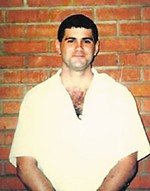Point Austin: Learning From Experience
The things they won't tell you in Texas schools
By Michael King, Fri., Sept. 24, 2010

Maybe you missed the big news that the Lubbock City Council is just moments away from imposing Shariah within city limits, and the Waxahachie council of elders is seriously considering requiring all female residents to wear burquas – just in time for the fall fashion season. That makes about as much sense as the willingness of the SBOE to seriously consider a resolution – proposed by a defeated Odessa SBOE candidate, no less – to end the "pro-Islamic/anti-Christian distortions in social studies texts." This ingrained textbook bias no doubt accounts for the thousands of Texas students arriving at high school as devout Baptists and Methodists and brisket aficionados, only to depart four years later as dedicated adherents of Islam – having somehow acquired heathen tastes for hummus, falafel, and non-American football.
Next thing you know, River Citians, they'll be taking up pool instead of billiards.
Like much of what the board does, the whole matter would be laughable, except that it is part and parcel of the current nationwide, venomous racial hysteria against anything considered "Muslim" or Arabic. The madness ranges from politically manufactured outrage over a "Ground Zero Mosque" that is neither at Ground Zero nor a mosque to copycat actions, some involving literally terrorizing violence, against mosques elsewhere. At its absolute worst, the media-fanned hysteria beats the drum for expanded war in the Middle East, heralding demands by U.S. politicians for military attacks on Iran, even though the threats alone violate international law.
Although the primary elections reflected a potential voting trend toward SBOE moderation, the current makeup of the board hasn't yet changed, and the loonies are just as likely as not to prevail on this issue as they have on other curriculum matters. It doesn't matter that the resolution condemns out-of-print books that haven't been used for years or that it employs a line-counting method of proving "bias" that is both inaccurate and preposterous, akin to arguing that the Ten Commandments are unimportant because they take up so little space in the Bible. Generating this kind of rancid nonsense is not about logic or accuracy; it's about maintaining reactionary pressure on the public schools, ignoring much more substantive issues like adequate resources and funding and preserving the delusion that only Christian warriors can hold the line against the onrushing Islamic hordes – you know, the Islamic hordes laying siege to Nacogdoches, right this minute, if only the lamestream liberal media would condescend to report it.
Where There's Smoke
It's often difficult to know whether the SBOE theatricals constitute farce or tragedy, but at the Forensic Science Commission, there's no doubt it's the latter. In a minimal attempt by the Legislature to inject some accurate, current science into Texas prosecutorial forensics – which bear no relation to the high-dollar magic acts featured on CSI – the commission is currently mired in a prolonged struggle over the Willingham debate, a review of the "fire science" (or lack of it) at the heart of a conviction for a 1991 fire that eventually resulted in the 2004 execution of Cameron Todd Willingham for the arson-murders of his three daughters.
Subsequent scientific review has strongly suggested not only that Willingham was innocent but that the fire itself was likely of accidental origin – and that the Corsicana fire investigators should have known enough to come to the same conclusion. D.A. Bradley has already accomplished his primary, if not express, purpose – to delay any commission conclusions about the investigation beyond the November election, since the undermining of an execution might cast a cloud on Gov. Perry's re-election campaign.
You might think that accurate forensic science is a sufficiently nonpartisan issue that everyone, most especially prosecutors, would want to get it right. In actual fact, crime in general and capital crimes in particular are so politicized in Texas that accuracy – and therefore justice – is persistently made subservient to convictions, and anything that might undermine that system is considered a threat.
Last week, wannabe attorney-general-in-waiting Bradley was visibly enraged that scientists on the commission rejected his staff-drafted report that would have exonerated the Willingham fire investigators without any serious review. Now he will have to preside over substantive discussion of the matter, perhaps even enduring testimony from forensic scientists who believe they can show that the Willingham investigation was clumsily botched. Bradley's not likely to change his mind – like Perry, he appears to believe that a conviction, however achieved, is synonymous with guilt – but perhaps a few more legislators, as well as citizens at large, will be persuaded that our criminal justice system and our institutional eagerness to execute often ride headlong and roughshod over constitutional protections and the due process of law.
As it happens, the October Texas Monthly features a lengthy and thorough recounting by Pamela Colloff of the Anthony Graves capital murder case – a Burleson County tale that features a sensationally heinous multiple murder, a long history of careless investigation and prosecutorial negligence and misconduct, as well as sloppy forensic science made to serve the prosecution's presumptive conclusions instead of accuracy and justice. As Chronicle readers who have followed Jordan Smith's years-long coverage of the case will know, Graves, on death row for nearly two decades, is almost certainly innocent and most certainly did not receive a fair trial. Although his conviction was finally overturned many years later, he is scheduled for retrial on the original charges next spring – and the prosecution appears determined to use, and the court to allow, the same tainted evidence against him.
Maybe someday, God willing, they'll teach this stuff in the Texas public schools.
Got something to say on the subject? Send a letter to the editor.












